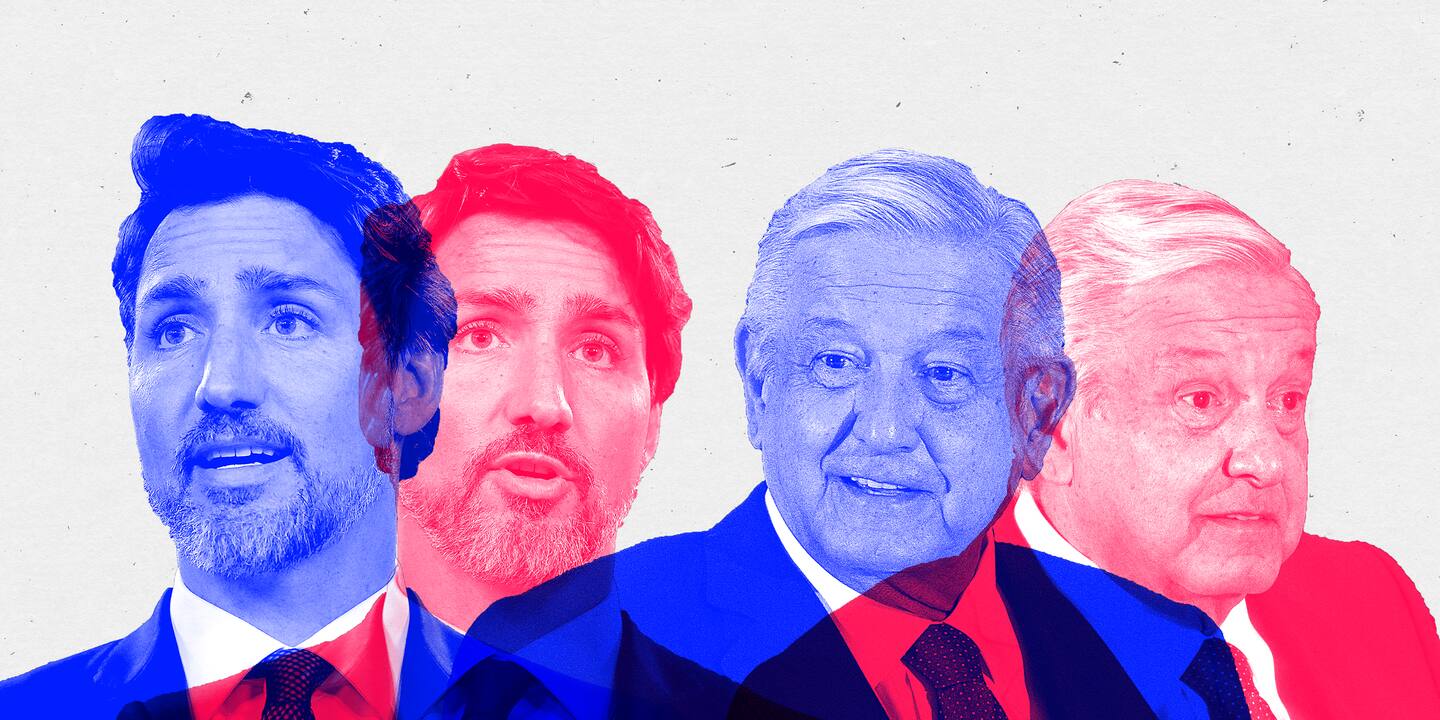What the U.S. election means for Canada and Mexico

In the final year of his term, Trump arguably has better relations with Mexican President Andrés Manuel López Obrador than with Trudeau. In July, López Obrador came to the White House to celebrate the signing of Trump’s rebranded version of the North American Free Trade Agreement. It was not markedly different from the treaty hashed out more than two decades ago, but it gave Trump another set-piece moment. Trudeau avoided the occasion, but López Obrador made it the first foreign outing of his presidency, no matter the rebukes of critics on both sides of the border.
Trump and America’s neighbors
López Obrador swept to power with a campaign that attacked Trump for his anti-immigrant and anti-Mexican politics. But since the charismatic populist took office, he has worked to accommodate Trump. López Obrador yielded to White House pressure and cracked down on Mexico’s porous southern border, thwarting Central American asylum seekers who hoped to reach the United States. He also acceded to Trump administration demands that migrants remain in Mexico while their U.S. asylum cases are pending, even as rights groups protested that many would fall prey to criminal groups.
López Obrador’s critics slammed him for joining Trump in the Rose Garden in July and declaring that the U.S. president had “changed” his attitude toward Mexicans. “A good part of the Mexican community would feel abandoned by our government in the face of racist attacks by U.S. officials, if there is no response from our government,” wrote Agustín Gutiérrez Canet, a Mexican commentator who is also the husband of the Mexican ambassador in Washington, warning against the “folly” of López Obrador’s visit.
“The alert bells should ring in Mexico’s National Palace,” warned Mexican daily El Financiero last month. “Perhaps you can imagine how Biden’s team felt when Mexico’s president went to Washington to endorse Donald Trump … The elections are not tomorrow, it is true, but the numbers suggest that the Mexican government’s bet in favor of Trump is on the way to failure.”
There have been no shortage of domestic travails for Trudeau over the course of the Trump presidency, but he has held the line, winning reelection last year while keeping Trump at a delicate arm’s length. The U.S. president still poses unique challenges for Canadian diplomacy: Trudeau’s now-infamous 21-second pause earlier this year when asked about Trump’s threats of a military response to U.S. protesters may have contributed to Canada’s embarrassing failure to win a temporary seat on the U.N. Security Council. Other governments were possibly wary that a Canadian seat would simply be a proxy for U.S. interests.
The sheer contrast between Trump and Trudeau — whose good looks, embrace of refugees and avowed feminism turned him into a global social media icon — has probably helped the Canadian leader. A considerable majority of Canadians view Trump negatively, and the chaos and polarization south of the border have cast Canada’s comparatively tranquil politics in a better light.
Earlier this month, Trudeau noted Canada was “extremely lucky” that, unlike in Trump’s America, the response to the coronavirus pandemic has not been a source of political division and strife. “There has been a concerted effort across orders of government, across political parties to work together, to be there for Canadians and to get this virus under control,” he said.
“The Trump years have been a challenging time for Canada-U.S. relations, but Trudeau has benefited politically from the perception that he has managed the relationship well,” Roland Paris, a professor of international affairs at the University of Ottawa and a former Trudeau adviser, told Today’s WorldView.
Although Trump’s ascent was “jarring for Canadians,” Paris added, Trudeau’s government “has adapted by establishing multiple lines of communication with the Trump administration and expanding its outreach at all levels of the U.S. political system,” especially to U.S. governors.
Ottawa has a template to deal with four more years of Trumpism. “If Trump is reelected, the Canadian government will remain on high alert for emerging problems, focusing less on what Trump says than what he does,” Paris said.
Biden and America’s neighbors
Still, Paris added, the prospect of a Biden presidency and the return of friendlier relations “deeply resonates” with many Canadians. “Biden’s policy priorities are more closely aligned with Canada on issues such as climate change, Russia, NATO, arms control, democracy, pluralism and immigration,” he said. “Bilateral cooperation would probably come easier.”
Facing south, Biden would scale back Trump’s harsh immigration policies and end the diversion of Pentagon funds to the construction of a border wall — for which, of course, Mexico never paid. He wants to refocus U.S. efforts on helping stabilize and develop a clutch of impoverished Central American nations, which contributed the bulk of asylum seekers attempting to enter the United States in recent years. And he is not expected to make López Obrador regret his overtures to Trump.
“I don’t think Biden will approach the relationship seeking to extract pain,” Arturo Sarukhan, a former Mexican ambassador in Washington from 2007 to 2013, told the Los Angeles Times. Sarukhan added, though, that “there will be a complete reset in discourse, narrative and engagement” in the U.S.-Mexico relationship.
But on both sides of the border, analysts don’t see a return to the bygone, pre-Trump era of hemispheric politics.
“A Biden presidency will mark a re-professionalization of the apparatus of the American state,” wrote Paul Wells in Canadian magazine Maclean’s. “People who know about product safety will be in charge of product safety. Diplomats will be ambassadors. Nuclear physicists will watch over nuclear power plants. … But if a preference for competence as a hiring criterion were enough to fix all that ails America, then the Obama presidency would have rendered a Trump presidency impossible.”
Read more:






